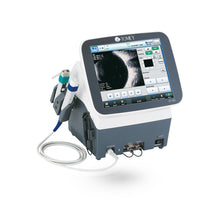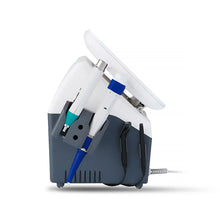Tomey Ultrasound AB
The Tomey UD-800 is an all-in-one ultrasound platform that seamlessly integrates B-Scan, Biometry, Pachymetry, and A-Scan diagnostics into a single compact system—designed to meet the full spectrum of ophthalmic imaging needs.
Engineered for precision and versatility, the UD-800 features an advanced 10 MHz dual-ring annular array B-Scan probe and a high-performance A-Scan biometry probe, delivering exceptional image clarity and measurement accuracy. Its high-resolution touchscreen interface and intuitive software simplify navigation through every diagnostic step, streamlining the clinical workflow.
Whether capturing biometric data, measuring corneal thickness, or performing detailed posterior segment imaging, the UD-800 offers reliability and speed. Flexible data management options allow clinicians to store results in the internal memory, export via USB or LAN, or print directly using the built-in or external printer (optional).
Designed for modern practices, the UD-800 combines powerful technology with user-friendly operation—making it the ideal solution for practices that demand comprehensive ultrasound diagnostics in one efficient device.
The Tomey UD-800 integrates a B-Scanner, Biometer, Pachymeter, and A-Scan into a single high-performance unit—designed to meet a wide range of ophthalmic diagnostic needs.
Equipped with next-generation annular array probes, a high-resolution touchscreen, and seamless data communication via USB or LAN, the UD-800 offers intuitive handling, speed, and efficiency. With its unique 10 MHz dual-ring B-Scan probe and high-precision A-Scan biometry probe included, this device serves as a powerful foundation for advanced diagnostic performance.
The intelligent software interface guides users smoothly through all measurement procedures. Results can be printed using the built-in or an external printer, saved internally, or exported to a PC. Fully DICOM-compliant, the UD-800 integrates effortlessly into hospital networks or supports straightforward data export—offering full flexibility for modern clinical environments.

The Tomey UD-800 comes standard with a high-resolution 10 MHz B-Scan probe, ensuring precise and detailed imaging. In addition, users can select from four optional probes tailored for specific diagnostic needs—allowing full customization of the system to suit a wide range of clinical applications. This flexible probe configuration ensures that the UD-800 adapts seamlessly to every practice’s unique requirements.

The Tomey UD-800's 10 MHz 2-ring array B-Scan probe offers high-resolution imaging with optimized wide-field tissue penetration—ideal for posterior segment evaluations. With a frame rate of 20 fps, 131 acoustic lines, and 256 grayscale levels, it provides smooth, detailed visualization.
Its wide image range (up to 48.0 mm / 52°) and measurement accuracy (±0.5 mm) ensure reliable diagnostics. The probe supports fine measurement steps (as small as 0.055 mm) and offers lateral and axial resolution of 0.6 mm.
Designed for safety and convenience, it includes a directional marker and supports wipe or immersion disinfection up to 10 mm from the tip. This probe is a key tool for precise and efficient ocular assessments.

Clinical Cases (10 MHz B-Scan probe with 2-ring array)

The UD-800 offers an optional A-Diagnostic probe for A-Mode diagnosis, enabling the detection of abnormal tissue characteristics through waveform analysis. This function allows clinicians to evaluate and differentiate ocular structures by observing amplitude spikes that indicate pathological changes. It's a valuable tool for detailed assessments beyond standard biometry, particularly in complex diagnostic cases.
The UD-800’s biometry module is a precise and efficient tool designed for accurate ocular measurements. It operates by transmitting ultrasound waves into the eye using a 10 MHz solid-state probe with a built-in red fixation LED, capturing the reflected echoes at various tissue interfaces. The time it takes for the ultrasound to travel from the corneal surface to the targeted tissue is measured and, using preset acoustic velocity values, the instrument calculates the length of ocular structures with a measurement range up to 45.00 mm, resolution of 0.01 mm, and ±0.1 mm accuracy. The system includes a powerful IOL power calculation function that supports multiple formulae, including Haigis (standard and optimized), Hoffer® Q, Holladay 1, SRK II, SRK/T, SRK SHOWA, Shammas-PL, and SRK/T Double K. These options ensure optimal results for both standard and post-refractive cataract surgeries. With this comprehensive feature set, the UD-800 biometry function provides all essential data to support confident intraocular lens power selection.

Biometry

IOL Calculation

Pachymetry with Central and Map Function
The Tomey UD-800 features a high-precision pachymetry mode using a 20 MHz solid-state probe with a 1.5 mm tip at 45°, designed for accurate corneal thickness measurements. It offers a measurement range of 150–1,500 μm, 1 μm resolution, and ±5 μm accuracy, ideal for refractive surgery planning and glaucoma evaluation. The system supports adjustable velocity settings and advanced bias analysis, ensuring reliable results across various clinical conditions.

The optional 40 MHz UBM probe for the Tomey UD-800 offers high-resolution anterior segment imaging without the need for a water bath, thanks to its disposable membrane waterproof cap. This innovation allows for quick, comfortable examinations—even with the patient in an upright position. It enables detailed visualization of the posterior iris, ciliary body, and bleb structures, making it especially valuable in the diagnosis of narrow or closed-angle glaucoma.

The UD-800 features intuitive software that manages all measurement results efficiently. Reports can be printed via the built-in or an external printer, and data can be saved directly to the internal database or a USB memory stick—supporting up to 52,000 eye records with a 32GB drive. Additionally, DICOM compatibility ensures seamless integration with hospital networks, while CSV and JPEG export options provide flexible data sharing and analysis.

The UD-800 is equipped with a video mode that enables real-time recording and playback directly on the device. This feature not only streamlines the diagnostic process—helping reduce examination time—but also enhances communication with patients, supporting informed consent. Each eye exam can store up to 200 images when using the 10 MHz B-scan probe. Playback controls allow for smooth video review, including frame-by-frame advance or reverse. While a video is playing, a “Stop” button is displayed for immediate control, ensuring precise observation and documentation.

Click here to see the brochure

Click here to see the manual
| 10 MHZ B-MODE (IMAGE DISPLAY) | |
| Frame Rate | Basic mode: 20 frame/sec |
| Image Display Range |
Standard: 35.2 mm/52° (at ultrasound velocity = 1550 m/sec) Wide: 48.0 mm/52° (at ultrasound velocity = 1550 m/sec) |
| Display Resolution |
Lateral accuracy: 0.6 mm Axial accuracy: 0.6 mm |
| 10 MHZ B-MODE | |
| Transducer Type | 2-ring |
| Scan Type | Sector scanning |
| Acoustic Lines | 131 lines (step by 0.4°) |
| AXIAL LENGTH MEASUREMENT (BIOMETRY) | |
| Axial Length | 15.00 mm to 45.00 mm |
| ACD | 1.80 mm to 7.00 mm |
| Lens Thickness | 2.00 mm to 6.00 mm |
| Measurement Accuracy | ±0.1 mm |
| Measurement Resolution | 0.01 mm |
| IOL POWER CALCULATION | |
| IOL Power Calculation | Haigis standard, Haigis optimised, Hoffer® Q, Holladay 1, SRK II, SRK/T, SRK SHOWA, Shammas-PL, SRK/T Double K |
| BIOMETRY PROBE | |
| Type | Solid state |
| Fixation Light | Built in the probe, Red LED |
| Transducer Frequency | 10 MHz |
| Tip Diameter | 5.3 mm φ |
| Dimensions/Weight | 8 mm φ × 100 mm/30 g |
| CORNEAL THICKNESS MEASUREMENT (PACHYMETRY) | |
| Measurement Range | 150 μm to 1,500 μm |
| Measurement Accuracy | ±5 μm |
| Measurement Resolution | 1 μm |
| PACHYMETRY PROBE | |
| Type | Solid state |
| Transducer Frequency | 20 MHz |
| Tip Diameter | 1.5 mm with an angle of 45° |
| Dimensions/Weight | 8.8 mm φ × 90 mm/40 g |
| A-SCAN DIAGNOSTIC | |
| Measurement Range | 60 mm |
| A-SCAN DIAGNOSTIC PROBE | |
| Type | Solid state |
| Transducer Frequency | 10 MHz |
| Tip Diameter | 6.0 mm φ |
| Dimensions/Weight | 8 mm φ × 100 mm/30 g |
| DIMENSIONS AND ELECTRICAL REQUIREMENTS | |
| Dimensions WDH | 310 mm x 214 mm x 326 mm |
| Weight | 6 kg |
| Voltage | 100 VAC to 240 VAC |
| Frequency | 50/60 Hz |
| Power Consumption | 120 VA |
| Display | TFT LCD 10.4'' colour touch screen |
| 10 MHZ B-MODE (IMAGE DISPLAY) | |
| Frame Rate | Basic mode: 20 frame/sec |
| Image Display Range |
Standard: 35.2 mm/52° (at ultrasound velocity = 1550 m/sec) Wide: 48.0 mm/52° (at ultrasound velocity = 1550 m/sec) |
| Display Resolution |
Lateral accuracy: 0.6 mm Axial accuracy: 0.6 mm |
| 10 MHZ B-MODE | |
| Transducer Type | 2-ring |
| Scan Type | Sector scanning |
| Acoustic Lines | 131 lines (step by 0.4°) |
| AXIAL LENGTH MEASUREMENT (BIOMETRY) | |
| Axial Length | 15.00 mm to 45.00 mm |
| ACD | 1.80 mm to 7.00 mm |
| Lens Thickness | 2.00 mm to 6.00 mm |
| Measurement Accuracy | ±0.1 mm |
| Measurement Resolution | 0.01 mm |
| IOL POWER CALCULATION | |
| IOL Power Calculation | Haigis standard, Haigis optimised, Hoffer® Q, Holladay 1, SRK II, SRK/T, SRK SHOWA, Shammas-PL, SRK/T Double K |
| BIOMETRY PROBE | |
| Type | Solid state |
| Fixation Light | Built in the probe, Red LED |
| Transducer Frequency | 10 MHz |
| Tip Diameter | 5.3 mm φ |
| Dimensions/Weight | 8 mm φ × 100 mm/30 g |
| CORNEAL THICKNESS MEASUREMENT (PACHYMETRY) | |
| Measurement Range | 150 μm to 1,500 μm |
| Measurement Accuracy | ±5 μm |
| Measurement Resolution | 1 μm |
| PACHYMETRY PROBE | |
| Type | Solid state |
| Transducer Frequency | 20 MHz |
| Tip Diameter | 1.5 mm with an angle of 45° |
| Dimensions/Weight | 8.8 mm φ × 90 mm/40 g |
| A-SCAN DIAGNOSTIC | |
| Measurement Range | 60 mm |
| A-SCAN DIAGNOSTIC PROBE | |
| Type | Solid state |
| Transducer Frequency | 10 MHz |
| Tip Diameter | 6.0 mm φ |
| Dimensions/Weight | 8 mm φ × 100 mm/30 g |
| DIMENSIONS AND ELECTRICAL REQUIREMENTS | |
| Dimensions WDH | 310 mm x 214 mm x 326 mm |
| Weight | 6 kg |
| Voltage | 100 VAC to 240 VAC |
| Frequency | 50/60 Hz |
| Power Consumption | 120 VA |
| Display | TFT LCD 10.4'' colour touch screen |










